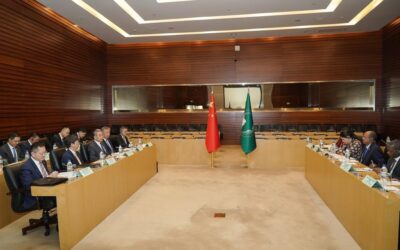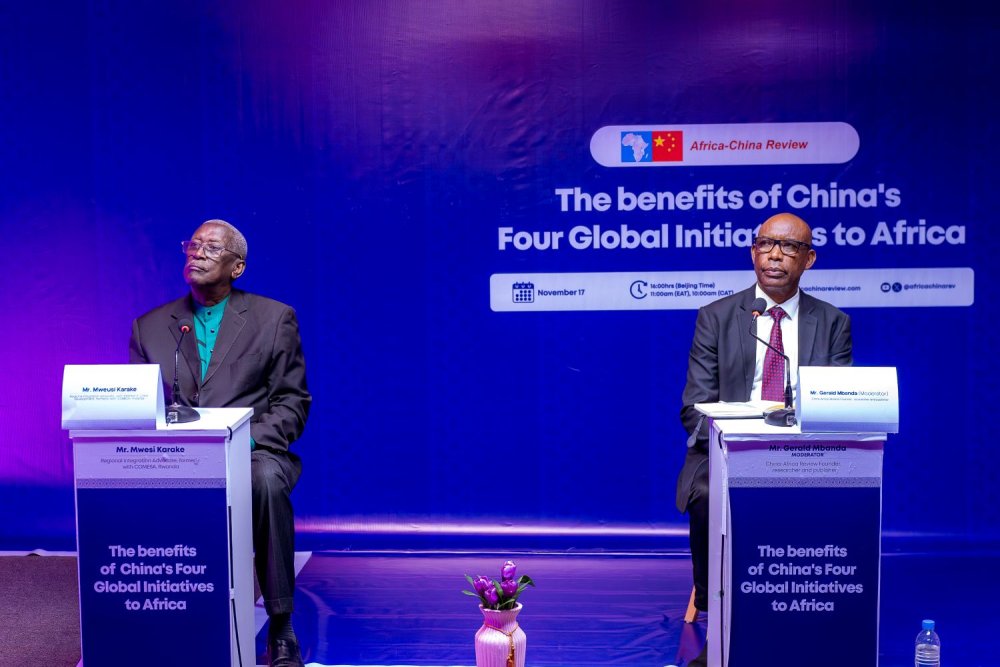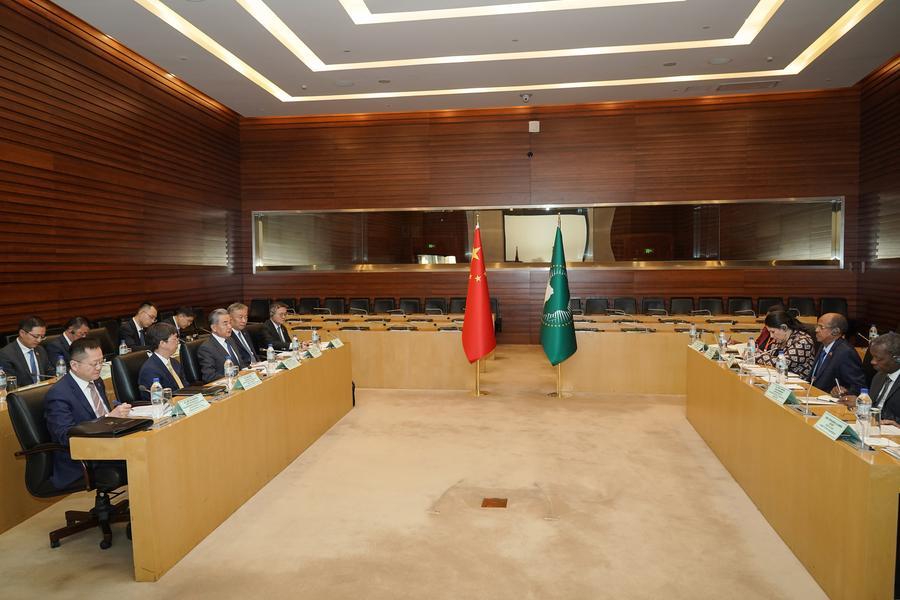Experts and scholars from China and Africa have underscored the transformative potential of China’s Four Global Initiatives in reshaping cooperation between the two regions.
These include the Global Development Initiative (GDI), Global Security Initiative (GSI), Global Civilization Initiative (GCI), and Global Governance Initiative (GGI), all reflecting China’s approach to tackling transnational challenges through multilateral cooperation and a shared future for humanity.
Since their inception, the initiatives have gained support from more than 100 countries and international organizations.
The discussions took place during a one-day webinar themed “The Benefits of China’s Four Global Initiatives to Africa,” organized by Africa-China Review in collaboration with the Chinese Embassy in Rwanda.
The event brought together academics, policymakers, and experts from both regions to exchange insights on how these frameworks are driving inclusive development, peace, and cultural exchange.
Professor Liao Fan, Director General and Senior Fellow at the Institute of World Economics and Politics, Chinese Academy of Social Sciences, described the four initiatives as “a systematic response to the challenges of our time.”
He said they aim to build “a fair, equitable, and inclusive international order” by promoting cooperation beyond zero-sum competition.
Prof. Fan also noted that together, the initiatives form “the four pillars of global stability and cooperation,” offering practical solutions to deficits in development, peace, and governance.
He emphasized Africa’s central role in advancing these frameworks, calling it “the heart of the Global South,” and praised the China–Rwanda partnership as “a vivid example of a community with a shared future for mankind.”
Prof. Wang Yongzhong, Director of the World Energy Department at the Chinese Academy of Social Sciences, shared lessons from China’s remarkable economic growth.
He highlighted how reforms, infrastructure investment, and openness fueled China’s rise from a closed, agrarian economy to the world’s second largest.
Prof. Wang emphasized that Africa and China are “highly complementary economies,” with Africa’s rich natural resources and young labor force aligning with China’s industrial and technological capacity.
Prof. Wang noted that Africa receives “around 40–45 percent of China’s global aid” and that Chinese foreign direct investment has driven industrialization, energy access, and connectivity across the continent.
Reforming global governance for inclusion
Dr. Felicien Ufitumukiza, Deputy CEO of the Rwanda Governance Board (RGB), called for “profound reforms of international organizations” to make them more inclusive and equitable.
He argued that “no country is big enough to succeed alone” and urged for Africa’s “active participation and representation in global decision-making.”
Dr. Ufitumukiza, presented Rwanda’s home-grown Governance Scorecard as a model for accountability and self-assessment, saying it serves as “a practical tool for driving policy reform and improving institutional performance.”
Africa’s opportunity for green and digital growth
Kenyan scholar Dr. Adhere Cavince, an international relations expert, said the Global Development Initiative holds “particular significance for Africa” by supporting the continent’s ambitions in poverty reduction, digital transformation, and green energy.
He applauded China’s “zero-tariff treatment for 53 African countries” and cited renewable energy partnerships as evidence of China’s role in “transforming African livelihoods.”
Dr. Cavince also emphasized technology transfer, saying, “It is only through this kind of collaboration that Africa can drive industrialization and create jobs for its young population.”
Cooperation for shared peace and stability
Dr. Ismail Buchanan, a senior lecturer at the University of Rwanda, reflected on the Global Security Initiative, describing it as a framework for “shared responsibility and mutual stability.”
He noted that Africa’s conflicts make “security a central challenge to development” and called for partnerships based on “dialogue rather than confrontation.”
Nicholas Dweh Nimley, Managing Editor of the South Liberia Post, said China’s four initiatives offer “pathways to real transformative progress” for countries like Liberia.
He explained that the GDI aligns closely with Liberia’s priorities in “agriculture, rule of law, education, sanitation, and tourism.”
Nicholas cited China-funded projects such as the National Clinical Diagnosis and Treatment Laboratory, as well as investments in “roads, hospitals, and the Capitol Building extension.”
He added that Liberia has “sent 22 agricultural experts to China to learn about food preservation” and praised China’s support in “media training and broadcasting infrastructure” as a means to strengthen cultural ties and counter negative stereotypes.
The session was moderated by Gerald Mbanda, Founder of Africa-China Review.
Virgile Rwanyagatare, Director General for Asia, Pacific and Middle East at Rwanda’s Ministry of Foreign Affairs, highlighted the GCI as an opportunity to deepen cooperation for the benefits of both countries’ people.
Meanwhile, China’s Ambassador to Rwanda, Gao Wenqi reaffirmed his country’s commitment to strengthening cooperation with African nations under the Four Global Initiatives proposed by President Xi Jinping.
Highlighting China’s role as Africa’s largest trading partner for 16 consecutive years, with trade hitting $295.6 billion in 2024 among others, Amb. Gao noted that the initiatives have “moved beyond concept to practice, delivering tangible results across Africa.”

The discussions took place during a one-day webinar themed “The Benefits of China’s Four Global Initiatives to Africa,” organized by Africa-China Review in collaboration with the Chinese Embassy in Rwanda.

Virgile Rwanyagatare, Director General for Asia, Pacific and Middle East at Rwanda’s Ministry of Foreign Affairs, highlighted the GCI as an opportunity to deepen cooperation for the benefits of both countries’ people.

China’s Ambassador to Rwanda, Gao Wenqi reaffirmed his country’s commitment to strengthening cooperation with African nations under the Four Global Initiatives proposed by President Xi Jinping.

Source: IGIHE








Oh my goodness! an amazing article dude. Thank you Nonetheless I’m experiencing concern with ur rss . Don’t know why Unable to subscribe to it. Is there anybody getting similar rss problem? Anyone who knows kindly respond. Thnkx
Die Planung ganzer Stadtteile in und um Saarbrücken, die
die heute in Brüssel, Luxemburg und Straßburg befindlichen Institutionen der Europäischen Union aufnehmen sollten, war bereits angelaufen. Oktober 1955 wurde schließlich nach einem heftig
geführten politischen Schlagabtausch eine Volksbefragung über
die Zukunft des Landes durchgeführt, wobei 67,7 % der Saarländer mit „Nein“
stimmten und sich damit gegen das Saarstatut entschieden. Juli 1955
wurden die prodeutschen Oppositionsparteien CDU, DPS
und DSP offiziell zugelassen, die sich zum Deutschen Heimat-Bund zusammenschlossen. Doch die oppositionellen Kräfte im eigenen Land,
die stattdessen einen baldigen Wiederanschluss an Deutschland forderten, wehrten sich
mit der gegen den Ministerpräsidenten gerichteten Parole „Der Dicke
muss weg“ massiv. Mit dem zur Abstimmung gestellten Saarstatut wären die bestehende Autonomie
sowie die Wirtschaftsunion mit Frankreich festgeschrieben worden, und das Saarland hätte zum
Kern eines neuen, vereinigten Europas werden können. Nationalsozialistischen Gesinnung in Westdeutschland zu dokumentieren.
Nach dem Ende des karolingischen Herrscherhauses
war die Abtei Mettlach dann ein Eigenkloster des Bistums Trier.
Jahrhundert hinein, dass der Trierer Bischofsstuhl und die Leitung der Abtei in Personalunion besetzt wurden. Ende des siebten Jahrhunderts gründete der fränkische Adlige Lutwinus die Abtei Sankt
Peter und Maria als Doppelkloster an der Stelle des heutigen Ortes Mettlach und trat selbst in das
Kloster ein, das der Benediktinerregel unterstellt war.
References:
https://online-spielhallen.de/rooli-casino-promo-code-so-maximieren-sie-ihre-vorteile/
Live chat connects you directly with knowledgeable representatives familiar with every platform aspect from game rules through payment processing.
We never compromise on this critical safeguard protecting minors from accessing real-money gaming platforms.
Responsible gaming foundations support our operational philosophy at
Ripper.
Experience the thrill of Ripper Casino, where over 2,500 games await your arrival.
This jurisdiction allows the casino to accept Australian players, although it’s worth noting that domestic licensing is not required for offshore operators at present.
You’ll be spinning the reels in no time, knowing your account is
secure and funded quickly. To fuel your gaming sessions, you
can easily top up your account using a variety of payment options.
With fair terms of just 30x (deposit + bonus) wagering, you can focus on winning big without
breaking the bank! Ripper Casino boasts an impressive library of over 2,500
games from top providers such as Pragmatic Play, BGaming, and Mascot Gaming.
No matter your style – whether you’re crypto-savvy or a good old-fashioned bank transfer fan – Ripper Casino Australia banking system
is all about flexibility and speed. If you’re all about that crypto life,
you’re in luck. Ripper Casino Australia cashback deals are here to soften the blow and keep you in the game.
Not quite ready to deposit? It’s simple – play your favourite titles,
and you could win cold, hard cash drops at any moment.
Most pokies and RNG table games on the site feature a
“Demo” or “Fun” mode. Here are answers to some of the
most common questions Australian players have about the platform.
The support team is known for being professional, friendly, and efficient, ensuring that
any interruptions to your gaming experience are minimized.
Skycrown online casino operates under a legitimate
gaming license, typically issued by the Government of Curacao.
This means the site follows strict rules to ensure fair play, data security, and
responsible gambling practices.💡 SkyCrown Casino, for example, is fully licensed and adheres to global gaming standards.✅
2. With a generous welcome bonus, fast withdrawals,
a great selection of crypto options, and mobile-friendly design, it ticks all the right boxes.
Below you’ll find a quick breakdown of everything SkyCrown Casino offers — from
its license and supported devices to bonus deals and
payment methods.
References:
https://blackcoin.co/king-billy-casino-review/
paypal casino uk
References:
https://reputable.cc/profile/samuellangston
paypal casino uk
References:
https://uaslaboratory.synology.me/
When I originally commented I clicked the -Notify me when new comments are added- checkbox and now each time a comment is added I get four emails with the same comment. Is there any way you can remove me from that service? Thanks!